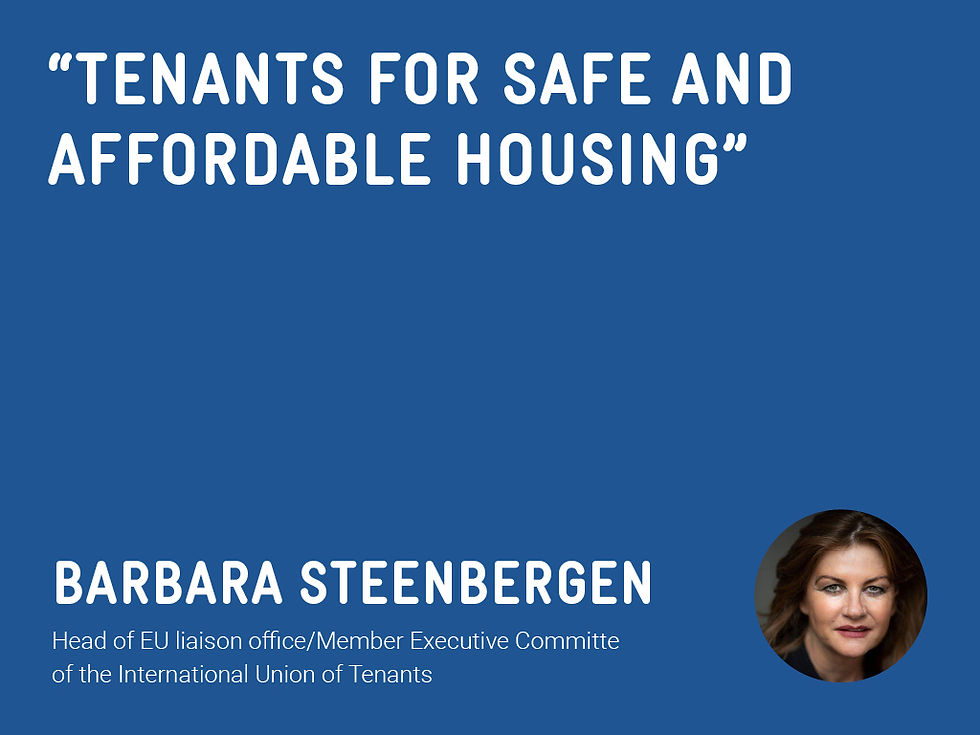Tenants for Safe and Affordable Housing
- International Union of Tenants
- Jun 1, 2023
- 3 min read
Updated: Oct 5, 2023

During the last century, the fight for affordable rents, fair housing legislation and the promotion of social, public and cooperative housing has remained a constant struggle. Similarly discouraging harmful and speculative practices remains an important focus of all tenant unions worldwide.
These challenges remain largely as topical now as a hundred years ago. The solutions to these issues depend not only on the era you happen to live in but also on where you happen to live.
Today’s challenges relate to the rapidly growing inequality in most countries: financialisation, gentrification, touristification, rising costs of living, energy poverty the absence of legal means to be part of decisions relating to your home and living environment; however, the essence remains to realise the right to housing as a fundamental human right. Residents must be protected against poor building practices and cost-cutting measures, instead ensuring buildings are built to withstand natural disasters.
Furthermore, apart from the humanitarian tragedies inflicted upon those having to live through the Russian attack on Ukraine, this war also entails a major shock hitting not only the European economy, but with a global impact. In many places, the rapidly increasing inflation has added to rising living costs, which is a major challenge, especially for low- and middle-income households. This leads to a constant increase in the need for adequate housing. Since the rising demand is not met by the construction activity, access to decent and affordable housing is becoming even tougher. In a European context, the policy as a direct result of the war converges around energy security and poses an immediate threat of energy poverty for large numbers of European tenants.
The current issues yet again highlight the importance of ensuring the following principles are observed by decision-makers, not only in Europe but globally:
Moratoria on evictions against tenants who have fallen behind with their payments is a crucial tool during periods of economic instability such as the current times.
The public funding for the energy-efficient renovation of public, affordable, cooperative and social housing is insufficient compared to incentives for private housing. This contributes to the further weakening of tenants with low-and-middle incomes, aggravating the energy poverty of an already fragile group. Public funding should be concentrated on public, affordable, cooperative and social housing as well as on affordable private rental apartments. Should public funding be used for private rental apartments, such arrangements must be subjected to specific conditions e.g. mandatory rent caps.
Policies on rent stabilisation and controls contribute to preventing the indexation of rents in the face of inflation driving up rents and limiting rent increases, especially in the private rental sector.
Policies on energy renovations are crucial to ensure renovations do not negatively affect tenants leading to ”renovictions” (no evictions by renovation and displacement of residents).
The maximum level of institutional tenants’ participation and democracy, ensure a level playing field, with landlords and housing providers.
The International Union of Tenants, therefore, calls on decision-makers across the globe:
To ensure the principle of ”housing cost neutrality” should be applicable to social, public and private housing in case renovations would lead to rent increases or not be cost neutral – meaning that renovation costs should no longer be passed on to tenants.
To ensure that energy-poor, low-and-middle income or vulnerable groups will not suffer from energy measures with direct or indirect impact on such groups. Consequently, energy poverty should be better defined to include comfort and health, decent standards of living and its causes: insufficient disposable income, high energy expenditures and poor energy efficiency of homes.
To engage with civil society organizations like tenant unions, in the form of a platform dedicated to energy poverty alleviation. Tenants Unions should have a say in the legislative process concerning rent stabilisation and control, the provision of affordable housing and the fight against energy poverty.





Kommentarer